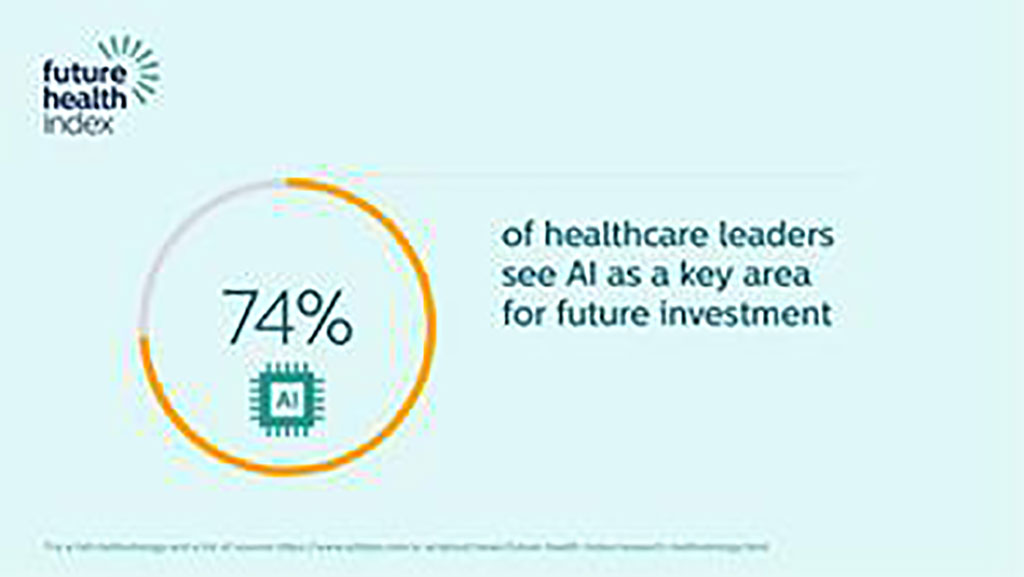Philips Global Survey Finds Healthcare Leaders to Increase AI Investment Post COVID-19 Pandemic
|
By HospiMedica International staff writers Posted on 10 May 2021 |

Illustration
Investments in artificial intelligence (AI) by healthcare leaders is all set to increase after the COVID-19 pandemic, according to the largest global survey of its kind covering nearly 3,000 healthcare leaders globally.
Royal Philips’ (Amsterdam, the Netherlands) Future Health Index (FHI) 2021 report: ‘A Resilient Future: Healthcare leaders look beyond the crisis’ is based on proprietary research across 14 countries, representing the largest global survey of its kind to analyze the current and future priorities of healthcare leaders worldwide. Feedback from healthcare leaders - including executive officers, financial officers, technology and information officers, operations officers and more - explores the challenges they have faced since the onset of the pandemic, and where their current and future priorities lie, revealing a new vision for the future of healthcare. With a focus on patient-centered healthcare enabled by smart technology, their vision is shaped by a fresh emphasis on partnerships, sustainability and new models of care delivery, both inside and outside the hospital.
While still grappling with the pandemic, 64% of healthcare leaders around the world continue to prioritize telehealth when it comes to digital health technology investments. This number is particularly high in the US (89%). However, in the next three years, only 40% expect to invest heavily in telehealth and AI emerges as a key area for investment (36% today, 74% in three years). Healthcare leaders in emerging economies like Saudi Arabia (98%), India (94%) and Russia (85%) plan to prioritize investments in AI the most in 2024, even more than those in the US. (80%).
Roughly one third (36%) of European healthcare leaders and one quarter (27%) of those in APAC agree that, to be prepared for the future, their hospital or healthcare facility most needs to invest in implementing predictive technologies like AI and machine learning. Notably, in technologically advanced Singapore, the numbers are higher, with nearly two thirds (62%) of healthcare leaders prioritizing an investment in AI post-pandemic. And while lower, Europe and APAC are still above the averages for the Americas (12%) and the Middle East & Africa (6%) when it comes to prioritizing AI in 2024.
“The Future Health Index 2021 report reflects pockets of positivity amid the COVID-19 crisis. Healthcare leaders have seen first-hand how digital health technology can ensure the continued delivery of care in incredibly difficult circumstances,” said Jan Kimpen, Chief Medical Officer, Philips. “Many are now reassessing their technology capabilities as they consider what’s next. While we can’t be sure what the next few years hold, what shines forth from this report is that healthcare leaders are committed to building healthcare systems that are sustainable, adaptable and - above all - resilient.”
Related Links:
Royal Philips
Royal Philips’ (Amsterdam, the Netherlands) Future Health Index (FHI) 2021 report: ‘A Resilient Future: Healthcare leaders look beyond the crisis’ is based on proprietary research across 14 countries, representing the largest global survey of its kind to analyze the current and future priorities of healthcare leaders worldwide. Feedback from healthcare leaders - including executive officers, financial officers, technology and information officers, operations officers and more - explores the challenges they have faced since the onset of the pandemic, and where their current and future priorities lie, revealing a new vision for the future of healthcare. With a focus on patient-centered healthcare enabled by smart technology, their vision is shaped by a fresh emphasis on partnerships, sustainability and new models of care delivery, both inside and outside the hospital.
While still grappling with the pandemic, 64% of healthcare leaders around the world continue to prioritize telehealth when it comes to digital health technology investments. This number is particularly high in the US (89%). However, in the next three years, only 40% expect to invest heavily in telehealth and AI emerges as a key area for investment (36% today, 74% in three years). Healthcare leaders in emerging economies like Saudi Arabia (98%), India (94%) and Russia (85%) plan to prioritize investments in AI the most in 2024, even more than those in the US. (80%).
Roughly one third (36%) of European healthcare leaders and one quarter (27%) of those in APAC agree that, to be prepared for the future, their hospital or healthcare facility most needs to invest in implementing predictive technologies like AI and machine learning. Notably, in technologically advanced Singapore, the numbers are higher, with nearly two thirds (62%) of healthcare leaders prioritizing an investment in AI post-pandemic. And while lower, Europe and APAC are still above the averages for the Americas (12%) and the Middle East & Africa (6%) when it comes to prioritizing AI in 2024.
“The Future Health Index 2021 report reflects pockets of positivity amid the COVID-19 crisis. Healthcare leaders have seen first-hand how digital health technology can ensure the continued delivery of care in incredibly difficult circumstances,” said Jan Kimpen, Chief Medical Officer, Philips. “Many are now reassessing their technology capabilities as they consider what’s next. While we can’t be sure what the next few years hold, what shines forth from this report is that healthcare leaders are committed to building healthcare systems that are sustainable, adaptable and - above all - resilient.”
Related Links:
Royal Philips
Latest COVID-19 News
- Low-Cost System Detects SARS-CoV-2 Virus in Hospital Air Using High-Tech Bubbles
- World's First Inhalable COVID-19 Vaccine Approved in China
- COVID-19 Vaccine Patch Fights SARS-CoV-2 Variants Better than Needles
- Blood Viscosity Testing Can Predict Risk of Death in Hospitalized COVID-19 Patients
- ‘Covid Computer’ Uses AI to Detect COVID-19 from Chest CT Scans
- MRI Lung-Imaging Technique Shows Cause of Long-COVID Symptoms
- Chest CT Scans of COVID-19 Patients Could Help Distinguish Between SARS-CoV-2 Variants
- Specialized MRI Detects Lung Abnormalities in Non-Hospitalized Long COVID Patients
- AI Algorithm Identifies Hospitalized Patients at Highest Risk of Dying From COVID-19
- Sweat Sensor Detects Key Biomarkers That Provide Early Warning of COVID-19 and Flu
- Study Assesses Impact of COVID-19 on Ventilation/Perfusion Scintigraphy
- CT Imaging Study Finds Vaccination Reduces Risk of COVID-19 Associated Pulmonary Embolism
- Third Day in Hospital a ‘Tipping Point’ in Severity of COVID-19 Pneumonia
- Longer Interval Between COVID-19 Vaccines Generates Up to Nine Times as Many Antibodies
- AI Model for Monitoring COVID-19 Predicts Mortality Within First 30 Days of Admission
- AI Predicts COVID Prognosis at Near-Expert Level Based Off CT Scans
Channels
Critical Care
view channel
Personalized Brain “Pacemakers” Could Help Patients with Hard-To-Treat Epilepsy
Epilepsy affects more than 50 million people worldwide, and nearly one-third of them do not respond to available medications. For many patients, seizures originate in brain areas responsible for essential... Read more
Microscopic DNA Flower Robots to Enable Precision Medicine Delivery
Creating materials that can sense, adapt, and respond to their environment like living organisms has long challenged scientists. Traditional synthetic materials lack the complexity and responsiveness found... Read moreSurgical Techniques
view channel
Novel Glue Prevents Complications After Breast Cancer Surgery
Seroma and prolonged lymphorrhea are among the most common complications following axillary lymphadenectomy in breast cancer patients. These postoperative issues can delay recovery and postpone the start... Read more
Breakthrough Brain Implant Enables Safer and More Precise Drug Delivery
Delivering medication directly to specific regions of the brain has long been a major challenge in treating neurological disorders. Current implants and infusion systems typically reach only one or two... Read morePatient Care
view channel
Revolutionary Automatic IV-Line Flushing Device to Enhance Infusion Care
More than 80% of in-hospital patients receive intravenous (IV) therapy. Every dose of IV medicine delivered in a small volume (<250 mL) infusion bag should be followed by subsequent flushing to ensure... Read more
VR Training Tool Combats Contamination of Portable Medical Equipment
Healthcare-associated infections (HAIs) impact one in every 31 patients, cause nearly 100,000 deaths each year, and cost USD 28.4 billion in direct medical expenses. Notably, up to 75% of these infections... Read more
Portable Biosensor Platform to Reduce Hospital-Acquired Infections
Approximately 4 million patients in the European Union acquire healthcare-associated infections (HAIs) or nosocomial infections each year, with around 37,000 deaths directly resulting from these infections,... Read moreFirst-Of-Its-Kind Portable Germicidal Light Technology Disinfects High-Touch Clinical Surfaces in Seconds
Reducing healthcare-acquired infections (HAIs) remains a pressing issue within global healthcare systems. In the United States alone, 1.7 million patients contract HAIs annually, leading to approximately... Read moreHealth IT
view channel
Printable Molecule-Selective Nanoparticles Enable Mass Production of Wearable Biosensors
The future of medicine is likely to focus on the personalization of healthcare—understanding exactly what an individual requires and delivering the appropriate combination of nutrients, metabolites, and... Read moreBusiness
view channel
Philips and Masimo Partner to Advance Patient Monitoring Measurement Technologies
Royal Philips (Amsterdam, Netherlands) and Masimo (Irvine, California, USA) have renewed their multi-year strategic collaboration, combining Philips’ expertise in patient monitoring with Masimo’s noninvasive... Read more
B. Braun Acquires Digital Microsurgery Company True Digital Surgery
The high-end microsurgery market in neurosurgery, spine, and ENT is undergoing a significant transformation. Traditional analog microscopes are giving way to digital exoscopes, which provide improved visualization,... Read more
CMEF 2025 to Promote Holistic and High-Quality Development of Medical and Health Industry
The 92nd China International Medical Equipment Fair (CMEF 2025) Autumn Exhibition is scheduled to be held from September 26 to 29 at the China Import and Export Fair Complex (Canton Fair Complex) in Guangzhou.... Read more
















